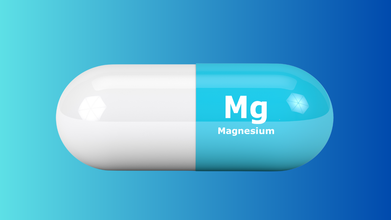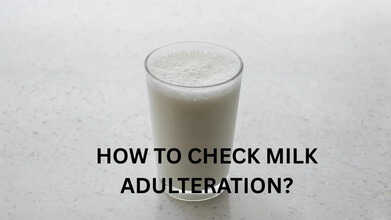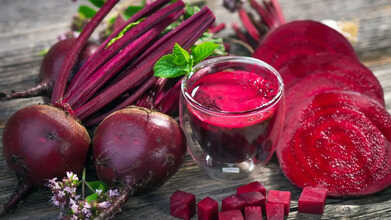- Health Conditions A-Z
- Health & Wellness
- Nutrition
- Fitness
- Health News
- Ayurveda
- Videos
- Medicine A-Z
- Parenting
- Web Stories
Do Health Shots Really Boost Immunity? Expert Breaks It Down

Image Credit: Canva
As far back as I can recall, people have been searching for ways to strengthen their immune systems—either through food, vitamins, or changes in lifestyle. As scientists continue to investigate how practical it is to "boost" immunity, all that has not prevented an increasing number of products from flooding the health and wellness industry. One of them is health shots, or immunity shots, which purport to give a strong dose of immune-boosting nutrients in a small, concentrated liquid.
Do wellness shots work, or are they another health trend? We spoke to Dr. Ravi Kesari, General Medicine Expert, to deconstruct the science behind these shots and if they actually do assist in strengthening your immune defenses.
What Are Health Shots?
Health shots have become popular as a quick-fix to boost immunity, especially during cold and flu season. Unlike injectables, these are tiny, liquid shots—found at grocery stores and juice bars—that usually comprise a combination of vitamins, minerals, and plant extracts.
In accordance with Dr. Kesari, the shots are made with ingredients that have immune-boosting properties, including:
Vitamin C – A widely recognized antioxidant that aids immune function.
Zinc – Required for immune response, but excess can lead to digestive problems.
Turmeric & Ginger – Recognized for anti-inflammatory effects.
Echinacea & Elderberry – Well-known herbal supplements supposed to alleviate symptoms of cold.
Apple Cider Vinegar – Frequently added due to its supposed health benefits in digestion.
Even though these compounds sound healthy, Dr. Kesari cautions that their potency depends on the dose, bioavailability, and the person's health.
Do Health Shots Work?
The immune system is a balancing act that takes advantage of strength over sudden "boosts." Although some vitamins—such as vitamins C and D, and zinc—play a part in immune function, taking them beyond a certain dose doesn't provide additional immunity.
Dr. Kesari clarifies, "Your body absorbs only what it needs. Overloading on vitamins does not strengthen your immune system—it merely results in waste or, in some instances, bad side effects."
For example, although vitamin C is crucial to immune function, megadoses won't stop infections. Also, although zinc is valuable in fighting colds, excessive intake may bring about nausea or even kidney stones.
Common Ingredients in Immunity Shots
Let's take a closer look at the most common ingredients in wellness shots and what science actually has to say about them:
Vitamin C & Zinc
Both of these nutrients have clearly defined immune roles, but beyond a certain point, more of them is not better. Indeed, too much could cause digestive upset or toxicity.
Echinacea & Elderberry
These natural ingredients are usually sold as shortening colds. According to some studies, they can provide some benefits but no concrete scientific evidence that they can prevent or cure infections significantly.
Ginger & Turmeric
The two spices contain anti-inflammatory properties and can potentially reduce inflammation in the body. They don't have any significant effect on immunity.
Apple Cider Vinegar
Apple cider vinegar is commonly found in wellness shots for its health benefits to the gut. Although it can benefit digestion, too much consumption can lead to the wear of tooth enamel as well as irritation of the stomach.
Are There Any Risks to Taking Health Shots?
Though wellness shots can be harmless, excessive consumption of some nutrients poses health risks. Dr. Kesari points out the following risks:
Vitamin & Mineral Overload – Excess amounts of vitamin C, zinc, or other vitamins and minerals may lead to toxicity, which causes digestive upset, kidney damage, or nerve impairment.
Medication Interactions – Certain herbal ingredients, such as Echinacea, can interfere with blood thinners or other drugs.
Gastrointestinal Problems – Large doses of apple cider vinegar can result in acid reflux, nausea, and enamel damage.
Dr. Kesari emphasizes, "Health shots should complement a balanced diet but should not be used as a substitute for whole foods or medical treatments."
Health Shots vs. Vaccination: Understanding the Difference
One of the biggest misconceptions is that health shots can replace vaccines. While wellness shots may offer nutritional benefits, they do not protect against infectious diseases the way vaccines do.
Dr. Kesari explains, "Vaccines are scientifically proven to prevent certain infections by building the body's immune system. Health shots, however, give temporary bursts of nutrients but do not offer immunity against viruses such as the flu or COVID-19."
Are Health Shots Worth It?
So, are you taking immunity shots? The response is determined by your overall diet and lifestyle. If you already eat a variety of nutrient-dense foods, you probably don't need them. But if you have trouble getting sufficient vitamins and antioxidants in your diet, an occasional wellness shot can be helpful.
What Really Supports a Healthy Immune System?
Rather than turning to quick fixes, Dr. Kesari suggests:
- Consuming a balanced diet rich in fruits, vegetables, and lean proteins.
- Having adequate rest, since deprivation of sleep undermines the immune system.
- Doing regular exercises to keep immune cells active.
- Remaining hydrated to facilitate optimal functioning of bodily processes.
- Managing stress, as chronic stress lowers immunity.
Health shots can be a handy supplement to your diet, but should never substitute for a balanced regimen of immunity. They are no magic bullet and may only confer short-term advantages. The key to immune support still lies with a healthy way of life, vaccines, and routine medical screenings.
If you are thinking of adding wellness shots to your regimen, speak with your physician, particularly if you have existing health issues or are on medication.
Dr Ravi Kesari is MBBS, MD- General Medicine at Apollo Spectra Hospital, Bangalore in India
Why Magnesium Matters More Than You Think

Credits: Canva
Magnesium supplements are everywhere. Whether you see it on pharmacy shelves or wellness blogs and social media where influencers who swear by them. You’ve probably heard someone claim that a daily magnesium tablet can help you sleep better, ease muscle cramps, or boost your mood. But do you actually need one, or is this just another wellness trend gone too far?
What Is Magnesium and Why Do We Need It?
Magnesium is an essential mineral that plays a crucial role in over 300 biochemical reactions in the body. It helps regulate muscle and nerve function, supports a healthy immune system, builds protein, maintains blood sugar and blood pressure levels, and aids in energy production.
Because the body doesn’t produce magnesium on its own, it must come from external sources such as food or supplements. The recommended daily intake varies: 310–420 mg for adults and 30–410 mg for children, depending on age and sex.
The good news? A balanced diet can easily meet these requirements. Magnesium-rich foods include nuts and seeds, leafy green vegetables, legumes, seafood, whole grains, and meat. Even dark chocolate can help, 100 grams of dark chocolate contains around 146 mg of magnesium.
Who Is at Risk of Magnesium Deficiency?
Most people get enough magnesium from food, but certain groups are more vulnerable to deficiency. These include people with gastrointestinal disorders such as Crohn’s disease or coeliac disease, those with type 2 diabetes, people who consume excessive alcohol, and older adults.
If you’re low on magnesium, you might notice symptoms such as muscle twitches, spasms, fatigue, low appetite, nausea, or an irregular heartbeat. However, the only way to confirm a deficiency is through a blood test prescribed by your doctor, which, in most cases, is covered by Medicare.
Can Magnesium Supplements Really Help?
Magnesium supplements are often promoted as a solution for muscle cramps, migraines, and insomnia. But do they actually work?
While magnesium deficiency can lead to cramps, most cases of muscle cramps are not due to low magnesium. Research shows limited evidence that supplements prevent cramps, especially in older adults.
The link between magnesium and better sleep is also unclear. Some studies found it helped people fall asleep faster, while others found no significant difference.
When it comes to migraines, evidence is stronger. Studies suggest that taking 122–600 mg of magnesium daily for 4–24 weeks may reduce the frequency and severity of migraines in some people.
Are Magnesium Supplements Safe?
In general, magnesium supplements are safe when taken in the recommended amounts. However, too much can lead to nausea, abdominal cramps, and diarrhea, because magnesium draws water into the intestines.
Taking extremely large doses (around 5,000 mg daily) can cause magnesium toxicity, which is dangerous. Always check with your doctor before starting supplements, especially if you take other medications.
Different Forms and What to Watch Out For
Magnesium is available in tablets, powders, and even topical forms like creams and bath salts. While these skin-based products may raise magnesium levels slightly, they’re less effective than oral supplements or food sources.
When buying supplements, check the label carefully. Most tablets contain 150–350 mg of magnesium, but formulations vary widely. Some also include additional nutrients like vitamins B6, C, or D, and minerals like calcium or manganese.
Be cautious with vitamin B6, high intake can cause nerve damage over time. If you already take a multivitamin containing B6, avoid magnesium supplements that also include it.
Think Your Milk Is Fresh? Simple Ways To Spot Adulteration At Home

Credits: Canva
Milk is one of the most common items found in every household and is considered a wholesome food packed with calcium, protein, and vitamin D.
It plays an important role in maintaining strong bones, building muscles, and supporting overall health. Because of its nutritional richness, milk is often called a complete food. However, it is essential to ensure that the milk you consume is pure and free from adulteration. Contaminated or diluted milk can lose its nutritional value and even harm your health. Fortunately, there are simple methods you can try at home to find out whether your milk is pure or adulterated.
What Is Milk Adulteration?
Food adulteration is the intentional act of reducing the quality of food by mixing or replacing it with inferior substances, or by removing essential components. The same applies to milk. While contamination of food can happen accidentally during storage, transport, or distribution, adulteration is done deliberately for profit.
Milk adulteration involves adding materials such as water, urea, detergent, or other chemicals to increase volume or extend shelf life. This practice reduces the nutritional value and can pose serious health risks to consumers.
How To Check Milk Adulteration at Home
There are a few simple ways to check for adulteration using common items at home:
- Water Test: Pour a small amount of milk onto a slanted surface. Pure milk flows slowly, leaving a white trail, while milk mixed with water flows quickly and leaves little or no mark.
- Detergent Test: Shake equal parts of milk and water. Pure milk forms a light foam, whereas adulterated milk creates thick, soapy froth.
- Starch Test: Add a few drops of iodine solution to the milk. If it turns blue, starch has been added.
- Urea Test: Mix a small amount of milk with soybean powder and dip red litmus paper into it. If the paper turns blue, it indicates the presence of urea.
What Happens When You Consume Adulterated Milk
Regularly drinking adulterated milk can cause several health issues from short-term stomach discomfort to severe, long-term illnesses. The exact effects depend on what substance has been added, ranging from diluted water to harmful chemicals.
Immediate Health Effects
- Digestive problems: Contaminants like urea, detergent, or unclean water can cause nausea, vomiting, diarrhea, and stomach cramps.
- Irritation and burning: Strong alkaline substances such as caustic soda may burn the mouth, throat, and digestive tract, damaging body tissues.
- Allergic reactions: Some chemical additives and impurities can trigger allergies, leading to rashes, itching, or breathing difficulty.
Long-Term Health Consequences
- Kidney damage: Chemicals like urea overwork the kidneys, increasing the risk of long-term damage or kidney failure.
- Liver problems: Preservatives such as formalin (formaldehyde) used to prolong milk’s freshness can harm the liver over time.
- Cancer risk: Long exposure to toxic compounds, including formalin and certain pesticides, has been linked to cancer.
- Heart disease: Artificial fats or vegetable oils added to milk can raise bad cholesterol, contributing to heart problems.
- Hormonal imbalance: Cattle injected with hormones like oxytocin can pass traces into milk, disrupting natural hormone levels in humans.
- Weakened immunity: Consuming impure milk regularly can weaken the immune system, making you more prone to infections.
- Nutritional deficiency: When milk is diluted or its nutrients are replaced with cheaper additives, it loses its health benefits. This is especially harmful for children, as it can affect their growth and development.
THIS Common Vegetable Juice Can Help Lower Your Blood Pressure Naturally

Credits: Canva
A common vegetable has been found to help reduce blood pressure in older adults, according to a new study. Beetroot juice can lower blood pressure in people aged 60 and above by targeting certain potentially harmful bacteria in the mouth. Researchers at the University of Exeter studied how younger and older adults responded to beetroot juice, which is rich in dietary nitrates. These nitrates are converted by the body into nitric oxide, a compound that relaxes and widens blood vessels, helping to lower blood pressure.
How the Study Tested Beetroot Juice on Younger and Older Adults
The study included 39 adults under the age of 30 and 36 adults in their 60s and 70s. For two weeks, each group received shots of beetroot juice. After a two-week break, during which participants used antiseptic mouthwash daily, they were given a placebo juice without nitrates for another two weeks.
Researchers analyzed the bacteria in participants’ mouths using gene sequencing. In both groups, the oral microbiome—the community of microorganisms in the mouth—changed after drinking nitrate-rich juice, though the effects were different depending on age. In older adults, there was a reduction in common bacteria that can sometimes cause infections and an increase in bacteria that support health. The older participants also showed lower blood pressure after two weeks of drinking the nitrate-rich juice.
Professor Andy Jones of the University of Exeter said, “This study shows that nitrate-rich foods can change the oral microbiome in ways that may reduce inflammation and lower blood pressure in older adults. This opens the door for larger studies to examine how lifestyle factors and biological sex affect responses to dietary nitrate supplements.”
Can A Person Drink Beet Juice While Taking Blood Pressure Medication?
It may be possible to drink beet juice while taking blood pressure medications. However, it’s important to consult a doctor before making any changes to a treatment plan for high blood pressure.
A doctor can advise whether combining beet juice with blood pressure medication could lower blood pressure too much. If this happens, a person may experience symptoms such as:
- Dizziness or lightheadedness
- Blurry vision
- Fainting
- Confusion
- Weakness or tiredness
- Headache
- Back or neck pain
- Heart palpitations
- Nausea
Low blood pressure (hypotension) can be serious. If someone experiences severe symptoms that do not improve when sitting or lying down, they should seek immediate medical attention.
Does Eating Beets Lower Blood Pressure?
Eating beets may help reduce blood pressure, but most research has focused on beet juice rather than whole beets.
Currently, there isn’t enough scientific evidence to confirm that eating beets has the same effect as drinking beet juice.
If someone wants to explore dietary changes to manage their blood pressure, it’s best to consult a doctor before making adjustments.
© 2024 Bennett, Coleman & Company Limited

